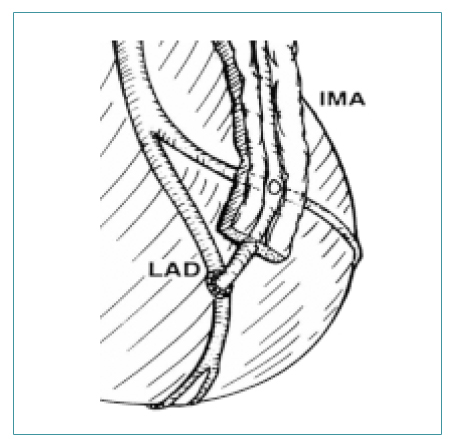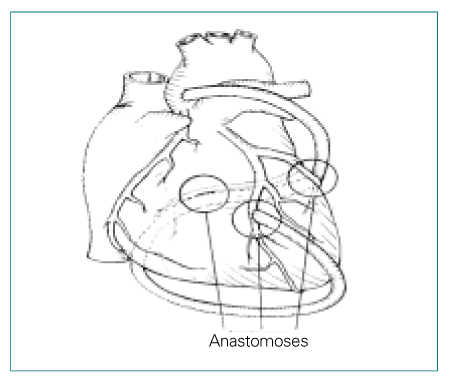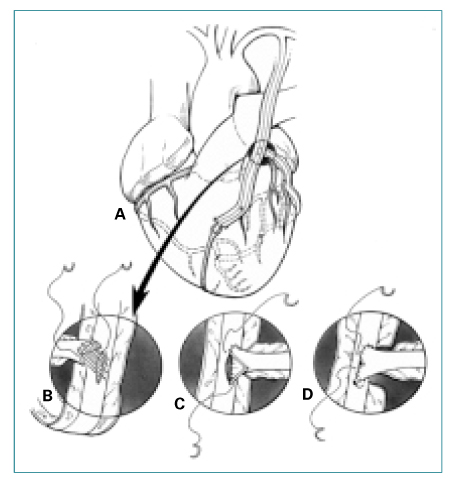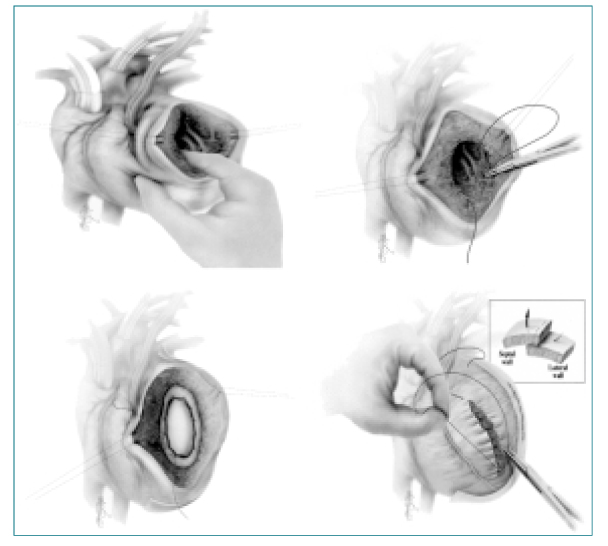J Korean Med Assoc.
2004 Aug;47(8):758-766. 10.5124/jkma.2004.47.8.758.
Surgical Treatment of Coronary Artery Disease
- Affiliations
-
- 1Department of Thoracic Surgery, Yonsei University College of Medicine, Yong-Dong Severance Hospital, Korea. kjy@yumc.yonsei.ac.kr
- KMID: 2183494
- DOI: http://doi.org/10.5124/jkma.2004.47.8.758
Abstract
- The main goals of coronary artery bypass grafting (CABG) are to relieve chest pain and to improve quality of life by bypassing all coronary artery segments with severe stenosis. It is a common surgical procedure on the heart. Until recently, most surgeons have used cardiopulmonary bypass (CPB) to provide a motionless and bloodless operation field to accomplish optimal microvascular anastomoses. However, CPB may have adverse sequelae, such as cerebrovascular accident, renal failure, and higher intellectual impairment, because of an inflammatory response caused by the blood circulating through the extracorporeal circuit and the formation of microemboli. In recent years, advances in retractor-stabilizer systems and in operative techniques that allow an access to all coronary artery segments have brought a growing attention to beating heart surgery without CPB (offpump coronary artery bypass grafting, OPCAB). OPCAB significantly lowers in-hospital morbidity and mortality compared with CABG. Heart failure after myocardial infarction poses a growing medical challenge as the life expectancy continues to increase. Recently it affects 0.4~1% of the overall population and 5% of elderly subjects. Although cardiac transplantation, a gold standard surgery for heart failure, provides excellent therapeutic outcomes in some patients with terminal stage of the disease, the overall outcomes are limited by the scarcity of donor organs, reduced long-term survival, and co-morbid conditions. Recently the efficacies of left ventricular volume reduction surgery, mitral valve repair, and bone marrow cell transplantation in improving the heart function in infracted myocardium of a failing heart have been extensively evaluated and were shown to result in good outcomes.
Keyword
MeSH Terms
-
Aged
Bone Marrow Transplantation
Cardiopulmonary Bypass
Chest Pain
Constriction, Pathologic
Coronary Artery Bypass
Coronary Artery Disease*
Coronary Vessels*
Heart
Heart Failure
Heart Transplantation
Humans
Life Expectancy
Mitral Valve
Mortality
Myocardial Infarction
Myocardium
Quality of Life
Renal Insufficiency
Stroke
Thoracic Surgery
Tissue Donors
Figure
Reference
-
1. Hosenpud JD, Bennett LE, Keck BM, Fiol B, Boucek MM, Novick RJ. The registry of the international society for heart and lung transplantation : Sixteenth official report-1999. J Heart Lung Transplant. 1999. 18:611–626.
Article2. Brann WM, Bennett LE, Keck BM, Hosenpud JD. Morbidity, functional status, and immunosuppressive therapy after heart transplantation : An analysis of the joint international society for heart and lung transplantation/united network for organ sharing thoracic registry. J Heart Lung Transplant. 1998. 17:374–382.3. Kolessov VI. Mammary artery-coronary artery anastomosis as method of treatment for angina pectoris. J thorac Cardiovasc Surg. 1967. 54:535–544.
Article4. Favaloro RG. Saphenous vein autograft replacement of severe segmental coronary artery occlusion : operative technique. Ann thorac Surg. 1968. 5:334–339.
Article5. Gibbon JH Jr. Application of a mechanical heart and lung apparatus cardiac surgery. Minn Med. 1954. 37:171–185.7. Roach GW, Kanchuger M, Mora Mangano CM, Newman M, Nussmeier N, Mangano D, et al. Adverse cerebral outcomes after coronary artery bypass surgery. N Engl J Med. 1996. 335:1857–1863.
Article8. Murkin JM, Boyd WD, Ganapathy S, Adams SJ, Peterson RC. Beating heart surgery. Ann Thorac Surg. 1999. 68:1498–1501.9. Mack MJ. Pro : beating heart surgery for coronary revascularization : is it the most important development since the introduction of the heart-lung machine? Ann thorac Surg. 2000. 70:1774–1778.
Article10. Cartier R, Blain R. Off-pump revascularization of the circumflex artery : technical aspect and short-term results. Ann thorac Surg. 1999. 68:94–99.
Article12. Hernandez F, Cohn WE, Baribeau YR, Tryzelaar JF, Charlesworth DC, O'connor GT, et al. In-Hospital outcomes of Off pump Versus On-pump Coronary Artery By-pass Procedures : A multicenter Experience. Ann thorac Surg. 2001. 72:1528–1534.
Article13. Puskas JD, Thourani VH, Marshall JJ, Dempsey SJ, Steiner MA, Guyton RA, et al. Clinical outcomes, angiographic patency, and resource utilization in 200 consecutive off-pump coronary bypass patients. Ann Thorac Surg. 2001. 71:1477–1484.
Article14. Detter C, Boehm D, Reichenspurner H, Deuse T, Arnold M, Reichart B. Robotically-assisted coronary artery surgery with and without cardiopulmonary bypass-from first clinical use to endoscopic operation. Med Sci Monit. 2002. 8(7):MT118–MT123.15. Hodgson JM, Singh AK, Drew TM, Riley RS, Williams DO, et al. Coronary flow reserve provided by sequential internal mammary artery grafts. J Am Coll Cardiol. 1986. 7:32–37.
Article16. Meurala H, Valle M, Hekaki P, et al. Patency of sequential versus single vein grafts in coronary bypass surgery. Thorac Cardiovasc Surg. 1982. 30:147–151.
Article17. Prioleau WH, Voegele LD, Hairston P. Flow in sequential vein grafts with diamond anastomosis. J Cardiovasc Surg. 1986. 27:477–479.18. Tector AJ, Kress DC, Downey FY, Schrnahl TM, et al. Complete revascularization with internal thoracic artery grafts. Semin Thorac Cardiovasc Surg. 1996. 8:29–34.19. Calafiore AM, Giammarco GD, Luciani N, Maddestra N, Nardo ED, Angelini R, et al. Composite arterial conduits for a wider arterial myocardial revascularization. Ann Thorac Surg. 1994. 58:185–190.
Article20. Calafiore AM, Contini M, Vitolla G, Mazze V, Mauro MD, Giammarco GD, et al. Bilateral internal thoracic artery grafting : Long-term clinical and angiographic results of insitu versus Y grafts. J Thorac Cardiovasc Surg. 2000. 120:990–998.
Article21. Dor V, Sabatier M, Di Donato M, Montiglio F, Toso A, Maioli M. Efficacy of endoventricular patch plasty in large postinfarction akinetic scar and severe left ventricular dysfunction : comparison with a series of large dyskinetic scars. J Thorac Cardiovasc Surg. 1998. 116:50–59.
Article22. Athanasuleas CL, Stanley AWH, Buckberg GD, Dor V, Di-Donato M, Blackstone EH. RESTORE group. Surgical anterior ventricular endocardial restoration (SAVER) in the dilated remodeled ventricle after anterior myocardial infarction. J Am Coll Cardiol. 2001. 37:1199–1209.
Article23. Buckberg GD. Rationale behind new non-transplant surgical approaches to advanced LV dysfunction and CHF. 2001 AATS symposium on adult cardiac surgery. 36–41.24. Bolling S, Pagani FD, Deeb M, Bach DS. Intermediate-term outcome of mitral reconstruction in cardiomyopathy. J Thorac Cardiovasc Surg. 1998. 115:381–388.
Article25. Menasche P, Hagege AA, Scorsin M, Pouzet B, Desnos M, Marolleau JP, et al. Myoblast transplantation for heart failure. Lancet. 2001. 357:279–280.
Article26. Stamm C, Westphal B, Kleine HD, Petzsch M, Kittner C, Steinhoff G, et al. Autologus bone-marrow stem-cell transplantation for myocardial regeneration. Lancet. 2003. 361:45–46.
Article
- Full Text Links
- Actions
-
Cited
- CITED
-
- Close
- Share
- Similar articles
-
- Recent Advances in Percutaneous Coronary Intervention in Coronary Artery Disease
- Surgical Treatment of an Aneurysmal Coronary Artery Fistula between the Left Coronary Artery and Right Atrium: A Case Report
- Spontaneous Coronary Artery Dissection and Woven Coronary Artery: Three Cases and a Review of the Literature
- Carotid ultrasound in patients with coronary artery disease
- CABG for an Adult with Coronary Disease due to Kawasaki Disease







